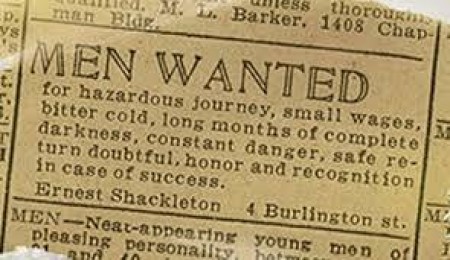Shackleton Probably Never Took Out an Ad Seeking Men for a Hazardous Journey
The famous tale of how Ernest Shackleton put together his Antarctic expedition is probably a myth
/https://tf-cmsv2-smithsonianmag-media.s3.amazonaws.com/filer/2013091012202209_10_2013_shackleton.jpg)
In the London newspaper The Times, the story goes, Sir Ernest Shackleton, the famed explorer of Antarctica, posted the following ad:
The pitch certainly captures a certain glorious spirit—“Ah, when ships were made of wood and men were made of steel…” said one Twitter user in response to the advert being shared by the Shackleton Foundation. In response to his posted ad, Shackleton was supposedly flooded with 5000 responses, men clamoring to take their chances on the icy southern continent. The story has been told and retold, and the quote has been riffed on to no end.
But here’s the problem. The ad, and the well-loved quote it bore, probably never existed.
For at least the past 12 years there’s been $100 on the line for anyone who can find a copy of the original advertisement. A modest sum, sure, but more than enough to stoke the interest of historians worldwide. Mark Horrell summarizes the long trail of evidence dug up by the Arctic Circle group of historians working on tracking down the clip:
So far amateur historians have searched The Times archive from 1785 to 1985 (a little over-zealous given Shackleton died in 1922), the entire archive of the South Polar Times, a magazine called The Blizzard, several issues of the Geographical Journal, and the archives of a number of other national and local London newspapers, without success. The earliest known source is a book published in 1944 called Quit You Like Men by Carl Hopkins Elmore, which in turn led to it appearing at No.1 in the 1949 book The 100 Greatest Advertisements by Julian Watkins, which in turn is quoted in Roland Huntford’s 1985 biography of Shackleton and numerous other books about polar exploration.
Shackleton did write a letter to the Times, but it read a little differently:
Sir,–It has been an open secret for some time past that I have been desirous of leading another expedition to the South Polar regions.
I am glad now to be able to state that, through the generosity of a friend, I can announce that an expedition will start next year with the object of crossing the South Polar continent from sea to sea.
I have taken the liberty of calling the expedition “The Imperial Trans Antarctic Expedition,” because I feel that not only the people of these islands, but our kinsmen in all the lands under the Union Jack will be willing to assist towards the carrying out of the full programme of exploration to which my comrades and myself are pledged.
Yours faithfully,
ERNEST H. SHACKLETON
Not only can no references be found to an original source, searching the Times itself leads to nothing. The months covering Shackleton’s preparations for his expeditions have been read, and the rest of the paper programmatically searched, but both methods have come up empty. It would not have even made sense for Shackleton to place an ad in the paper. There was plenty of free press coverage of his expedition, and he would already have had plenty of men to choose from. Some of the descendents of his men remember being told their ancestors responded to an ad Shackleton placed in the paper, but this was likely a recollection based on reading the ad rather than something they were actually told. Frank Worsley, one of the crew members, wrote his memoirs and did not record seeing an ad, instead he just happened upon the expedition’s offices and decided to apply. Inspiring though it may be, it seems that Shackleton’s famous ad is mostly likely a myth.
People love the Shackleton advertisement and the tale it tells about the spirit of these brave adventurers. But though their harrowing expedition, and the achievements of Shackleton and his men were real, the ad that brought them all together, sadly, was probably not.
More from Smithsonian.com:
Tasting Shackleton’s Whisky
Reliving Shackleton’s Epic Endurance Expedition
/https://tf-cmsv2-smithsonianmag-media.s3.amazonaws.com/accounts/headshot/smartnews-colin-schultz-240.jpg)

/https://tf-cmsv2-smithsonianmag-media.s3.amazonaws.com/accounts/headshot/smartnews-colin-schultz-240.jpg)